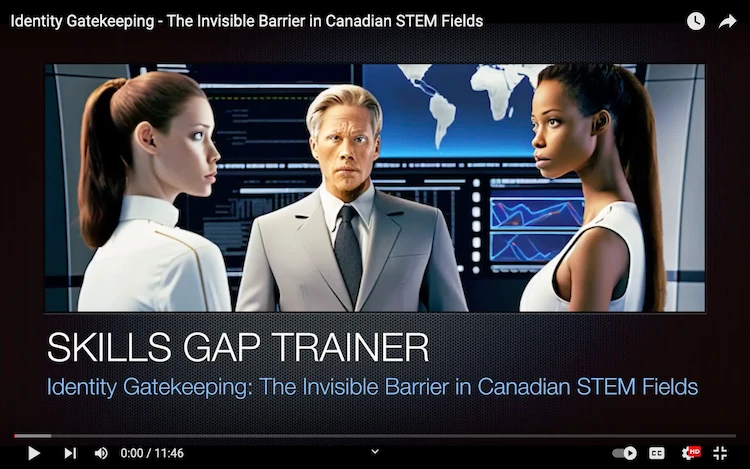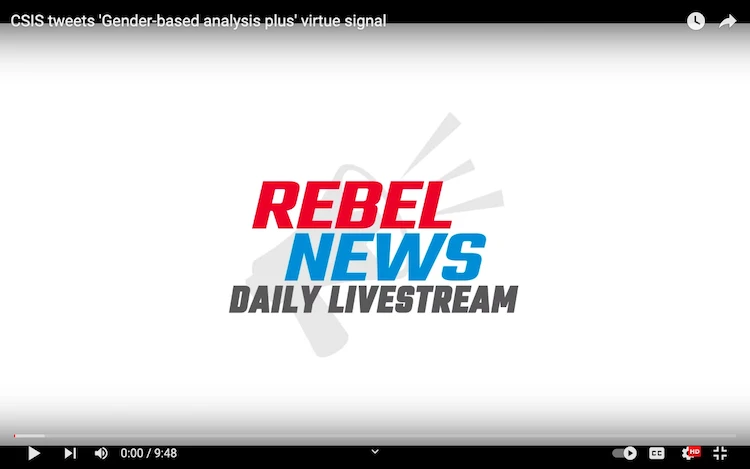Description: This is our comment to the video clip “CSIS tweets ‘Gender-based analysis plus’ virtue signal” posted on the Rebel News YouTube channel.
We, a group of STEM professionals, represent a variety of fields and skills. Our ranks include every kind of millennial STEM professional you can think of, computer scientist with a knack for fixing motorcycles, a mechanic specializing in industrial trucks, an electrician specializing in residential construction, a web developer who also repairs cars and everything else you can think of, a computer scientist who teaches online, a software engineer developing innovative apps, a masters in computer science designing AI algorithms, an information systems professional running a teaching business, and a Gen X tech entrepreneur undertaking web projects. We have worked tirelessly, often putting in long hours, and have poured our hearts into our fields.
We, like many others in our fields, and like most Canadian citizens, began our journeys under the tutelage of brilliant minds hardened and trained by the difficult and challenging realities of the Cold War and post World War II motivations and aspirations to build a better world using technology, which was the reason we won the war. These teachers imbued in us a culture of tenacity and meritocracy, which we have carried with us through decades of education and work. We were molded by their resilience, and we aspired to imitate and learn about their genius, and we strive to contribute to Canada’s growth and progress, just as they did.

But society is now facing a perplexing hurdle: identity gatekeeping. This is happening across various sectors in Canada, from banks to provincial public services, from research institutions to academic circles, from cybersecurity to public service recruitment, from grant evaluations for scientific promotion to the awarding of research and teaching grants. It’s a widespread phenomenon, and it’s holding back everyone’s potential.

And it’s not just about us or society. It’s about everyone who has faced these arbitrary identity gatekeepers, the stories are everywhere, and so is the fear of mentioning it. In Canada, individual speech with original ideas that contrasts with group ideas, has been punished with social ostracism as an accepted practice for decades. However, public speech relating to identity gatekeeping would be punished with a prevention of a career or commerce ability. It’s about the engineers struggling to justify their projects through the lens of the World Economic Forum or United Nations pamphlets ideologies rather than the expertise in robotics or critical infrastructure application security that is the work task required. It’s about the software developers trying to align their work with the “identity” checkboxes instead of their skills in coding and project management, bank work, research agencies, teaching work, or IT professional support work.
Tamara Ugolini, your tireless commitment to the truth shines through in your work at Rebel News. The nature of the issues we face today in the STEM field in Canada is complex and multifaceted. Critical projects, such as ‘robotics embedded control systems for tanks’ or ‘critical infrastructure cybersecurity’, promotion of science engineering projects, require deep technical competence, understanding, and the rigorous application of engineering or science principles. By their very essence, these projects are agnostic to the identity or ideological beliefs of the professionals driving them. What truly matters are the skills, knowledge, and experience they bring to the table.
However, we find ourselves in a troubling state where gatekeepers in positions of influence appear to be prioritizing identity politics and ideological allegiance over professional competence and technical merit. This shift in focus from professionalism and regulation to identity politics seems to undermine the essence of engineering and science, potentially compromising the quality, effectiveness, and safety of critical projects. These ideological attributes are not part of the background, upbringing, education, training, experiences, nor are they relevant to the project evaluation mechanisms. Yet, they are gatekeepers enforce rules they do not understand the fundamentals of or the relevancy of, and cannot even explain or write about if challenged to pass an essay exam about it.
Our concern is that this trend extends beyond just the evaluation of projects and leads to the removal of the concept of the designated professional, the authorities of the communities of professionals, and all the associated oaths and authorities which come with such professional power. In a disconcerting shift from professionalism designations, our STEM professionals, who were once recognized by unique self-regulating legislation and symbolic identifiers, are now finding their authority re-engineered on a monolithic level, often tied to non-professional administrative agents within state related offices. Such a shift risks overlooking the intrinsic value of professional expertise, and the professional expertise of professional communities, in ensuring public safety and upholding the standards of their respective fields. We are saddened and concerned, that the public was not made aware of these changes, and that a public and televised debate never occurred with all of the professional STEM members and philosophers of Canada, or a debate among the professional workers never occurred with a widely understood justification for such changes.
Furthermore, the value of professional references from regulated professionals, such as engineers, applied scientists, technologists, information systems professionals, and computer scientists, seem to be diminishing in the face of identity affirmations, but these letters actually do matter in employee selection for technical projects or for any other kinds of projects. To allow individuals to be hired with the images of the work of other individuals, and then to hire them simply based on letters of identity and allegiance to a group narrative, is demoralizing for most people. This is not just demoralizing for our professionals but also sends a dangerous message that one’s identity and ideological beliefs hold more weight than one’s skills and knowledge. This shift risks undermining the STEM fields at large. Has society thought through the consequences of the unique identity of the professional, is no longer unique and no longer professional.
It is through voices like yours that we can challenge these gatekeepers and reestablish the values of competence and professionalism in our nation. The question that remains is how far will this trend go? If such a shift extends to our police and healthcare workers, what will be the impact on our society’s future? .
It’s important to clarify that when we talk about ‘identity gatekeeping’, we are not suggesting a rejection of diversity, inclusion, or the recognition of different cultures. We believe in a society where every individual, regardless of their background, has a fair chance to succeed based on their abilities, competence, and hard work. What we’re challenging is the idea that cultural or identity attributes should be prerequisites for opportunities, overshadowing merit and competence.
STEM professionals come from all corners of the globe. They belong to different cultures, races, and identities. But these factors shouldn’t be the defining parameters of their professional success. Valuing merit and competence doesn’t harm any culture, it rather ensures that the best ideas, the best projects, and the most competent professionals get the recognition and opportunities they deserve, irrespective of their identity.
We need to stand against this. It’s not just about the individual sacrifices and struggles of STEM professionals. It’s about preserving the authenticity of knowledge, the integrity of our educational system, the integrity of science, the meritocracy of our society, and the resilience of our nation. We need to safeguard our financial future, our scientific future, our societal progress, and our national security.
Let’s champion a system that values merit, competence, and hard work over identity. Let’s remember our roots, remember the lessons from our brilliant teachers, and honour their legacy. Let’s be the gatekeepers of our own destiny, shaping the future of our society through the principles of fairness, opportunity, and meritocracy.
Tamara, struggle of Canadian professionals resonates with each one of us who have faced the invisible barriers erected by gatekeepers. Together, we stand for a future where every person’s worth is measured by their competence and hard work, not their identity. This aligns with the spirit of all the teachers of Canada, all the STEM professionals, and all the citizens who have lived and worked under the values of merit & dedication. This is what we were trained on. This is what we were brought up with.
There are those who use identity politics as if it has been around for the last 30 years, as if it was part of our collective upbringing, but we know that’s not the case. This is not recognizable as Canadian. Our upbringing, education, and professional lives have been shaped by resilience, perseverance & a relentless pursuit of knowledge & competence.
Let’s stand for these values. Let’s challenge these identity gatekeepers & strive for a Canada where the worth of an individual is recognized based on their skills, knowledge & contributions, not their identity.
Tamara Ugolini, though we’ve only seen two short video clips, this is our first impression. Your authentic character and commitment to truth resonate strongly in this video. Your unique and potent name evokes an Italian instrument not yet invented. Just as STEM professionals from all around the world contribute to our incredible nation, you do so as well, highlighting the issue of identity gatekeeping. Your thought process mirrors that of an engineer, bringing a refreshing perspective. Although STEM professionals may not currently have a direct voice in our national conversation, your reports echo their thoughts. It’s high time mainstream media yield to voices like yours that strive to reinstate merit and competence over identity gatekeeping. Your efforts are paving the way for change. And, don’t let the bad man bully you and Rebel News.
STOP BILL C-21 – Petition Details – Change.org https://www.change.org/p/canadian-government-stop-bill-c-21
“Take Action! Send a letter or e-mail letter to a Senator in the The Senate of Canada Today!” https://sencanada.ca/en/senators/
Related books and resources:
“Weapons of Math Destruction: How Big Data Increases Inequality and Threatens Democracy” by Cathy O’Neil: This book provides a critical look at how algorithms and AI are affecting society, underscoring the importance of ethical AI development.
“Algorithms of Oppression: How Search Engines Reinforce Racism” by Safiya Umoja Noble: This work delves into the racial and gender biases entrenched in technology and search algorithms.
“Brotopia: Breaking Up the Boys’ Club of Silicon Valley” by Emily Chang: This book explores gender inequality in the tech industry, providing insights relevant to STEM fields at large.
“The Ethics of Invention: Technology and the Human Future” by Sheila Jasanoff: This work examines the ethical considerations surrounding technology and innovation, relevant to discussions about professional values in STEM.
“So You Want to Talk About Race” by Ijeoma Oluo: While not specific to STEM, this book offers valuable insights on discussing race and diversity, which are applicable to conversations about identity in any field.
“Race After Technology: Abolitionist Tools for the New Jim Code” by Ruha Benjamin: This work explores the intersection of race and technology, particularly looking at how technological tools can perpetuate systemic racism.
“The Fuzzy and the Techie: Why the Liberal Arts Will Rule the Digital World” by Scott Hartley: This book argues for the importance of diverse skill sets in tech and STEM fields, supporting the idea of breaking down identity gatekeeping by valuing a range of perspectives and disciplines.
“The Diversity Delusion: How Race and Gender Pandering Corrupt the University and Undermine Our Culture” by Heather Mac Donald – This book challenges the current narratives surrounding diversity initiatives in academic and professional settings, which could provide insight about systemic issues.
“Political Tribes: Group Instinct and the Fate of Nations” by Amy Chua – Chua explores the effect of tribalism on politics and society, offering perspectives that might illuminate the experiences of conservative individuals in various fields, including STEM.
“The Coddling of the American Mind: How Good Intentions and Bad Ideas Are Setting Up a Generation for Failure” by Greg Lukianoff and Jonathan Haidt – This book addresses the culture of safetyism and its impact on universities and professions, potentially relevant to understanding the dynamics affecting white men and conservatives.
“The War on Science: Who’s Waging It, Why It Matters, What We Can Do About It” by Shawn Otto – While not directly addressing race or political orientation, this book explores the broader challenges facing the scientific community, which could be contributing factors to systemic issues.
“The Once and Future Worker: A Vision for the Renewal of Work in America” by Oren Cass – Cass’s book focuses on the value of work and the challenges faced by the working class, offering perspectives that might be relevant to understanding systemic issues in STEM fields.
“Woke, Inc.: Inside Corporate America’s Social Justice Scam” by Vivek Ramaswamy- This critique of corporate social justice initiatives may provide context for understanding the experiences of individuals who feel marginalized due to their political views.
“Heterodox Academy: Problems and Proposals” by Jonathan Haidt and others – A collection of essays addressing the lack of viewpoint diversity in academia, which could help elucidate challenges faced by conservative academics in STEM.
“Facing Reality: Two Truths about Race in America” by Charles Murray – Murray discusses issues of race and inequality in America, offering data and viewpoints that might contribute to a broader understanding of systemic issues in various sectors.
To see our Donate Page, click https://skillsgaptrainer.com/donate
To see our Instagram Channel, click https://www.instagram.com/skillsgaptrainer/
To see some of our Udemy Courses, click SGT Udemy Page
To see our YouTube Channel, click https://www.youtube.com/@skillsgaptrainer

